- Home
- John Boyne
This House Is Haunted Page 2
This House Is Haunted Read online
Page 2
We made our way, arm in arm, towards Lancaster Gate, passing the Italian Gardens on our left as we bisected Hyde Park through the central path. Emerging some twenty minutes later from the Queen’s Gate, I thought I saw a familiar face appearing through the fog and, when I narrowed my eyes to make out the visage, I gasped, for was this not the same countenance that I had seen in the mirror the previous morning, the reflection of my own late mother? I pulled Father closer to me, stopping on the street in disbelief, and he turned to look at me in surprise just as the lady in question appeared from the miasma and nodded a greeting in my direction. It was not Mother of course—how could it have been?—but a lady who might have been her sister, or a cousin, for the resemblance around the eyes and brow was uncanny.
The rain began almost immediately then, falling heavily, great drops tumbling on our heads and coats as people ran for shelter. I shivered; a ghost walked over my grave. A large oak tree a little further along the pavement offered shelter and I pointed towards it but Father shook his head, tapping his index finger against his pocket-watch.
“We’ll be there in five minutes if we hurry,” he said, marching along the street faster now. “We might miss it entirely if we seek refuge.”
I cursed myself for having forgotten my umbrella, which I had left by the front door during the business about the muffler, and so we ran through the forming puddles towards our destination unprotected and when we arrived, we were soaked through. I shivered in the vestibule, peeling my sodden gloves from my hands, and longed to be back in front of the fireplace in our comfortable home. Beside me, Father began a fit of coughing that seemed to build from the very depths of his soul and I despised those other entrants who glanced at him contemptuously as they passed. It took a few minutes for him to recover and I was for hailing a hansom cab to take us home again but he would hear none of this and marched ahead of me into the hall, and what, in the circumstances, could I do but follow?
Inside, perhaps a thousand people were gathered together, equally damp and uncomfortable, a stench of wet wool and perspiration pervading the atmosphere. I looked around, hoping to find a quieter part of the room for us to sit, but almost every chair was taken by now and we had no choice but to choose two empty seats in the centre of a row, surrounded by shivering, sneezing audience members. Fortunately we did not need to wait long, for within a few minutes Mr. Dickens himself appeared to tumultuous applause and we stood to receive him, cheering loudly to his evident delight, for he stretched his arms wide as if to take us all into his embrace, acknowledging the wild reception as if it was entirely his due.
He showed no sign of wanting the ovation to subside and it was perhaps five minutes more before he finally moved to the front of the stage, waving his hands to indicate that we might suspend our admiration for a few moments, and permitted us to take our seats once again. He wore a sallow expression and his hair and beard were rather dishevelled but his suit and waistcoat were of such a rich fabric that I felt a curious urge to feel the texture beneath my fingers. I wondered about his life. Was it true that he moved as easily in the back alleys of London’s East End as he did in the privileged corridors of Balmoral Castle, where the Queen in her mourning had reputedly invited him to perform? Was he as comfortable in the company of thieves, pickpockets and prostitutes as he was in the society of bishops, cabinet ministers and leaders of industry? In my innocence, I could not imagine what it would be to be such a worldly man, famous on two sides of the ocean, beloved by all.
He stared out at us now with a hint of a smile on his face.
“There are ladies present tonight,” he began, his voice echoing across the chamber. “Naturally I am delighted by this but also distressed for I hope that none of you are of the sensitive disposition that is peculiar to your sex. For, my dear readers, my friends, my literati, I do not propose to entertain you this evening with some of the more preposterous utterances of that delightful creature Sam Weller. Nor do I plan on uplifting your spirits through the bravery of my beloved boy Master Copperfield. Neither shall I seek to stir your emotions through a retelling of the last days of that unfortunate angel Little Nell Trent, may God have mercy on her soul.” He hesitated, allowing our anticipation to build, and we watched him, already captivated by his presence. “Instead,” he continued after a long pause, his voice growing deep and mellifluous now, the words emerging slowly, “I intend to read a ghost story that I have only recently completed, one which is scheduled to appear in the Christmas number of All the Year Round. It is a most terrifying tale, ladies and gentlemen, designed to stir the blood and unsettle the senses. It speaks of the paranormal, of the undead, of those pitiful creatures who wander the afterlife in search of eternal reconciliation. It contains a character who is neither alive nor deceased, neither sentient nor spirit. I wrote it to chill the blood of my readers and despatch ghouls into the beating heart of their dreams.”
As he said this a cry went up from halfway down the hall and I turned my head, as did most of those in attendance, to see a young woman of about my own age, twenty-one, throwing her hands in the air and running down the aisle in fright. I sighed and secretly despised her for disgracing her sex.
“Should any other ladies wish to leave,” said Mr. Dickens, who appeared to be delighted by this interruption, “might I urge you to do so now? I would not like to interrupt the flow of the story and the time has come for me to begin.”
At these words, a small boy appeared from the side of the stage, approached the novelist and offered a low bow, before thrusting a sheaf of pages into Mr. Dickens’ hand. The boy ran off, the writer glanced at what he held, looked about him with a wild expression on his face and began to read.
“Halloa! Below there!” he shouted in such an extraordinary and unexpected roar that I could not help but jump in my seat. A lady behind me uttered an oath and a gentleman on the aisle dropped his spectacles. Apparently enjoying the reaction that his cry had caused, Mr. Dickens paused for a few moments before continuing, whereupon I quickly found myself entranced by his tale. A single spotlight illuminated his pale face and his tone fluctuated between characters, describing fear, confusion and distress with only a slight change of modulation to his tone. His sense of timing was impeccable as he said one thing that made us laugh, then another that made us feel unsettled and then a third that made us leap in fright. He portrayed the two characters at the centre of the story—a signalman who worked by a railway tunnel and a visitor to that place—with such gusto that one almost believed that there were two actors on stage performing either role. The tale itself was, as he had suggested in his introduction, a disconcerting one, centring on the signalman’s belief that a spectre was informing him of calamities to come. The ghost had appeared once and a terrible crash had ensued; he had appeared a second time and a lady had died in the railway carriage as it passed. It had appeared a third time more recently, gesticulating wildly, urging the signalman to get out of the way, but as yet no misfortune had occurred and the nervous fellow was distressed at the thought of what horror might lie ahead. I considered Mr. Dickens rather devilish in the manner in which he took pleasure in stirring the emotions of his audience. When he knew that we were scared, he would incite us further, building on the threat and menace he had laid out for us and then, when we were certain that a terrible thing was about to happen, he would let us down, peace would be restored and we who had been holding our collective breaths in anticipation of some fresh terror were free to exhale and sigh and feel that all was well in the world once again, which was when he took us by surprise with a single sentence, making us scream when we thought we could relax, terrifying us into the depths of our very souls and allowing himself a brief smile at how easily he could manipulate our emotions.
As he read, I began to fear that I might not sleep that night, so certain was I that I was surrounded by the spirits of those who had left their corporeal form behind but had not yet been admitted through the gates of heaven and so were left to trawl through the world,
crying aloud, desperate to be heard, causing disarray and torment wherever they went, uncertain when they would be released to the peace of the afterlife and the quiet promise of eternal rest.
When Mr. Dickens finished speaking, he bowed his head and there was silence from the audience for perhaps ten seconds before we burst as one into applause, leaping to our feet, crying out for more. I turned to look at Father who, rather than appearing as thrilled as I had anticipated, wore a pale expression, a sheen of perspiration gleaming on his face, as he inhaled and exhaled in laboured gasps, staring at the floor beneath him, his fists clenched in a mixture of determination to recover his breath and a fear that he might never do so.
In his hands, he clutched a handkerchief stained with blood.
Departing the theatre into the wet and cold night, I was still trembling from the dramatics of the reading and felt certain that I was surrounded by apparitions and spirits, but Father seemed to have recovered himself and declared that it was quite the most enjoyable evening he had spent in many years.
“He’s every bit as good an actor as he is a writer,” he pronounced as we made our way back across the park, reversing our earlier walk, the rain starting yet again as we marched along, the fog making it almost impossible for us to see more than a few steps ahead of ourselves.
“I believe he often takes part in dramatics,” I said. “At his own home and the homes of his friends.”
“Yes, I’ve read that,” agreed Father. “Wouldn’t it be wonderful to be invited to—”
Another coughing fit overtook him and he struggled for air as he bent over, assuming an undignified position on the street.
“Father,” I said, putting my arm around his shoulders as I attempted to right him. “We must get you home. The sooner you are out of those wet clothes and lying in a hot bath the better it will be.”
He nodded and struggled on, coughing and sneezing as we leaned on each other for support. To my relief the rain came to an abrupt halt as we rounded Bayswater Road for Brook Street, but with every step I took I could feel my feet growing more and more soaked through my shoes and dreaded to think of how wet Father’s must be. Finally we were home and he forced himself into the metal bathtub for a half hour before changing into his nightshirt and gown and joining me in the parlour.
“I shall never forget tonight, Eliza,” he remarked when we were seated side by side by the fire, sipping on hot tea and eating buttered toast, the room filled again by the scent of cinnamon and chestnuts from his pipe. “He was a capital fellow.”
“I found him truly terrifying,” I replied. “I enjoy his books almost as much as you, of course, but I wish he had read from one of his dramatic novels. I don’t care for ghost stories.”
“You’re frightened by them?”
“Unsettled,” I said, shaking my head. “I think any story which concerns itself with the afterlife and with forces that the human mind cannot truly understand risks disquiet for the reader. Although I don’t think I’ve ever experienced fear in the way that others do. I don’t understand what it is to be truly frightened, just how it feels to be disconcerted or uncomfortable. The signalman in the story, for example. He was terrified at the horror he knew was sure to come his way. And that woman in the audience who ran screaming from the hall. I can’t imagine what it must feel like to be that scared.”
“Don’t you believe in ghosts, Eliza?” he asked and I turned to look at him, surprised by the question. It was dark in the room and he was illuminated only by the glow of the reddened coals that made his eyes appear darker than usual and his skin glow with the colour of the sporadic flames.
“I don’t know,” I said, uncertain how I truly felt about the question. “Why, do you?”
“I believe that woman was an imbecile,” declared Father. “That’s what I believe. Mr. Dickens had barely even begun to speak when she took fright. She should have been excluded from the start if she was of such a sensitive disposition.”
“The truth is I’ve always preferred his more realistic tales,” I continued, looking away. “The novels that explore the lives of orphans, his tales of triumph over adversity. Masters Copperfield, Twist and Nickleby will always hold a greater place in my affections than Mr. Scrooge or Mr. Marley.”
“Marley was dead, to begin with,” stated Father in a deep voice, imitating the writer so well that I shuddered. “There is no doubt whatever about that.”
“Don’t,” I said, laughing despite myself. “Please.”
I fell asleep quite soon after going to bed but it was a fitful and unhappy sleep. My dreams were supplanted by nightmares. I encountered spirits where I should have undertaken adventures. My landscape was dark graveyards and irregular vistas rather than Alpine peaks or Venetian canals. But nevertheless I slept through the night and when I woke, feeling groggy and out of sorts, the morning light was already coming through my curtains. I looked at my wall clock; it was almost ten past seven and I cursed myself, knowing that I would certainly be late for work and still had Father’s breakfast to prepare. However, when I entered his room a few minutes later to see whether his condition had improved in the night, I could see immediately that he was far more ill than I had previously realized. The rain of the evening before had taken hold of him and the chill seemed to have entered into his very bones. He was deathly pale, his skin damp and clammy, and I took great fright, dressing immediately and running to the end of our mews where Dr. Connolly, a friend and physician of long standing, lived. He came back with me and did everything in his power, I have no doubt of that, but he told me there was nothing we could do but wait for the fever to break, or hope that it would, and I spent the rest of the day by Father’s bedside, praying to a god who did not often trouble my thoughts, and by early evening, when the sun had descended again to be replaced by our perpetual and tormenting London fog, I felt Father’s grasp of my hand grow weaker until he slipped away from me entirely, gathered quietly to his reward, leaving me an orphan like those characters I had spoken of the night before, if one can truly be called an orphan at twenty-one years of age.
Chapter Three
FATHER’S FUNERAL TOOK place the following Monday morning in St. James’s Church in Paddington and I took some comfort in the fact that half a dozen of his co-workers from the British Museum, along with three of my own colleagues from St. Elizabeth’s School where I had employment as a teacher of small girls, attended to offer their sympathies. We had no living relatives and so there were very few mourners, among them the widow who lived next door to us but who had always seemed loath to acknowledge me in the street; a polite but shy young student whom Father had been mentoring in his insect studies; our part-time domestic girl, Jessie; and Mr. Billington, the tobacconist on Connaught Street who had been providing Father with his cinnamon-infused tobacco for as long as I could recall and whose presence made me feel rather emotional and grateful.
Mr. Heston, Father’s immediate superior in the Department of Entomology, held my right hand in both of his, crushing it slightly, and told me how much he had respected Father’s intellect, while one Miss Sharpton, an educated woman whose employment had initially caused Father some disquiet, informed me that she would miss his lively wit and excellent humour, a remark that rather astonished me but which I nevertheless found consoling. (Was there a side to Father that I did not know? A man who told jokes, charmed young ladies, was filled with bonhomie? It was possible, I supposed, but still something of a surprise.) I rather admired Miss Sharpton and wished that I could have had an opportunity to know her better; I was aware that she had attended the Sorbonne, where she was awarded a degree, although naturally the English universities did not recognize it, and apparently her own family had cut her off on account of it. Father told me once that he had asked her whether she was looking forward to the day when she would get married and thus not have to work any more; her reply—that she would rather drink ink—had scandalized him but intrigued me.
Outside the church, my own employer, Mrs. Farnsw
orth, who had taught me as a girl and then hired me as a teacher, informed me that I must take the rest of the week to grieve but that hard work could be an extraordinary restorative and she looked forward to welcoming me back to school the following Monday. She was not being heartless; she had lost a husband the year before, and a son the year preceding that. Grief was a condition that she understood.
Mercifully, the rain stayed off while we laid Father to rest but the fog fell so deeply around us that I could barely make out the coffin as it descended into the ground and, perhaps a blessing, I missed that moment when one is aware of laying eyes on the casket for the final time. It seemed to be simply swallowed up by the mist, and only when the vicar came over to shake my hand and wish me well did I realize that the burial had come to an end and that there was nothing left for me to do but go home.
I chose not to do so immediately, however, and instead walked around the graveyard for a time, peering through the haze at the names and dates etched into the tombstones. Some seemed quite natural—men and women who had lived into their sixtieth or, in some cases, their seventieth years. Others felt aberrant, children taken while they were still in their infancy, young mothers buried with their stillborn babies in their arms. I came across the grave of an Arthur Covan, an erstwhile colleague of mine, and shuddered to remember our one-time friendship and his subsequent disgrace. We had developed a connection for a brief period, Arthur and I, one that I had hoped would blossom into something more, and the memory of those feelings, combined with the knowledge of the damage that troubled young man had caused, only served to upset me further.
Realizing that this was not perhaps a sensible place for me to linger, I looked around for the gate but found myself quite lost. The fog grew thicker around me until I could no longer read the words on the headstones, and to my right—extraordinary thing!—I was certain I heard a couple laughing. I turned, wondering who would behave in such a fashion here, but could see no one. Uneasy, I reached a hand out before me and could make nothing out beyond my gloved fingertip. “Hello,” I said, raising my voice only a little, uncertain whether I truly wanted a response, but answer came there none. I reached a wall where I hoped for a gate, then turned and almost fell over a group of ancient headstones piled together in a corner, and now my heart began to beat faster in anxiety. I told myself to be calm, to breathe, then find the way out, but as I turned round I let out a cry when I was confronted by a young girl, no more than seven years of age, standing in the centre on the path, wearing no coat despite the weather.

 Beneath the Earth
Beneath the Earth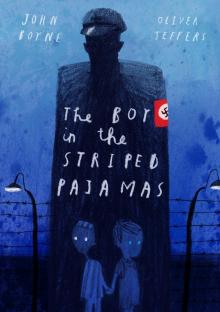 The Boy in the Striped Pajamas
The Boy in the Striped Pajamas Next of Kin
Next of Kin The House of Special Purpose
The House of Special Purpose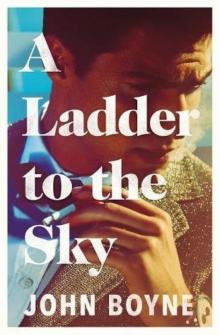 A Ladder to the Sky
A Ladder to the Sky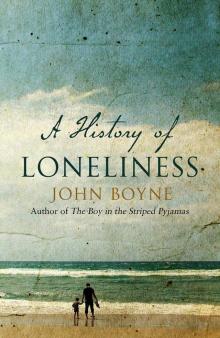 A History of Loneliness
A History of Loneliness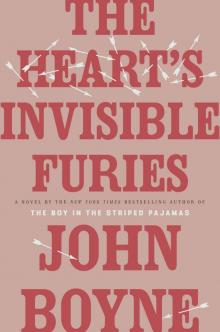 The Heart's Invisible Furies
The Heart's Invisible Furies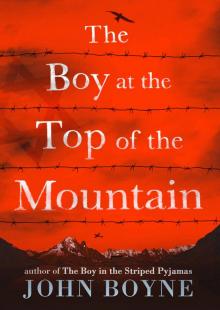 The Boy at the Top of the Mountain
The Boy at the Top of the Mountain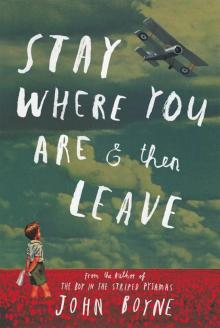 Stay Where You Are and Then Leave
Stay Where You Are and Then Leave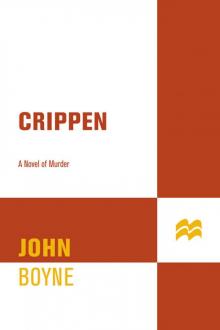 Crippen: A Novel of Murder
Crippen: A Novel of Murder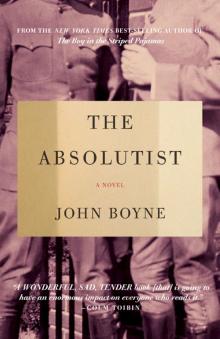 The Absolutist
The Absolutist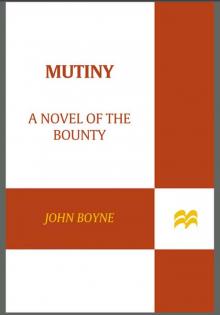 Mutiny: A Novel of the Bounty
Mutiny: A Novel of the Bounty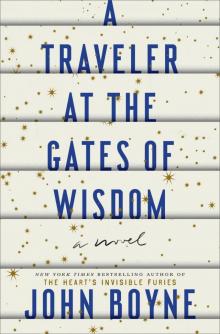 A Traveler at the Gates of Wisdom
A Traveler at the Gates of Wisdom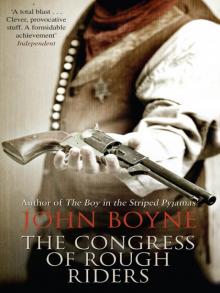 The Congress of Rough Riders
The Congress of Rough Riders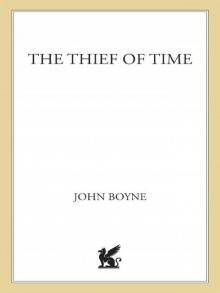 The Thief of Time
The Thief of Time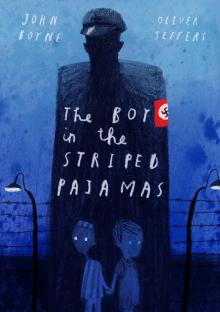 The Boy in the Striped Pajamas (Deluxe Illustrated Edition)
The Boy in the Striped Pajamas (Deluxe Illustrated Edition)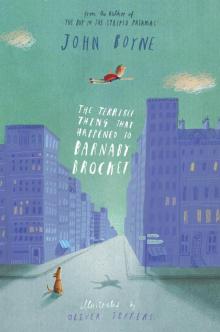 The Terrible Thing That Happened to Barnaby Brocket
The Terrible Thing That Happened to Barnaby Brocket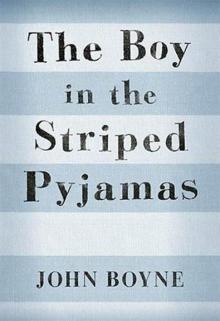 The Boy In The Striped Pyjamas
The Boy In The Striped Pyjamas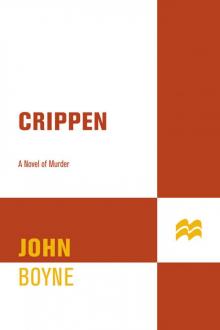 Crippen
Crippen